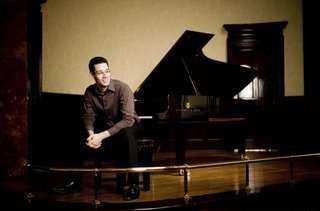|
Back
The Soloist Meets the Collaborator New York
Alice Tully Hall, Lincoln Center Complex
11/10/2009 -
Franz Schubert: Piano Sonata in A Major, D.959
Schwanengesang (Swan Song) for voice and piano, D. 957
Randall Scarlata (Baritone), Jonathan Biss (Piano)

J. Biss (© Benjamin Ealovega)
My musical introduction to Jonathan Biss was neither in concert, recital or on disk. Instead it was (gulp) the Silver Screen. Namely Phil Grabsky’s erudite and entertaining movie In Search of Beethoven, where Mr. Biss, with one day’s growth of beard, and Roger Norrington’s laid-back Camerata Salzburg played part of the Second Piano Concerto. The group exhibited such informal joy, such an easygoing good-fellowship in their art, I vowed to see him in person.
Nothing, though, was informal in Mr. Biss’s solo work in this part of the Chamber Music Society of Lincoln Center “Raising Schubert” series. Granted the long A Major Sonata is a work which demands the utmost seriousness, with utmost challenges. But even the volatility, even that enigmatic dissonant recitative of the slow movement can teeter on agony and sensitivity at the same time.
Ms. Biss’s Schubert was a wild excursion into an unknown (and certainly not Viennese) work. His Beethovenian opening was obviously a descent into musical chaos, the long melodic lines becoming blurred, the energy almost anarchic. One didn’t remember the keyboard clunkers (three or four) as much as Mr. Biss’s feeling that the young Schubert was an old Lear standing on a blasted heath.
Of course the slow movement returned to momentary sanity, since the second half deserves the bursts of hot air. Nobody ever can discover what Schubert wanted to do here, but no good pianist ever regretted essaying it. And Mr. Biss is technically quite a dazzler. Charm was not part of the package, but this was Mr. Biss’s Schubert, and it would be unfair to compare him to the Brendels of this world.
Certainly there was no hesitation as an accompanist in the second half. Judging by his film debuts, Jonathan Biss revels in other colleagues, and his collaboration with baritone Robert Scarlata was delightful. Mr. Biss rightly did not stay in the background, nor should he have for this great collection of Schubert songs. In “Der Atlas”, he allowed his piano to give percussive clarity to the complex score. He was graceful and interesting in the happier songs. In “The City”, Biss, usually thrifty with his pedal, lets his piano resonate along with Mr. Scarlata’s sweeping lyricism.
If one can imagine the voice of the iconic “Irish tenor” put down a few notches, this would be Randall Scarlata. His voice is colorful, open, firmly focused with an obvious joy in dramatizing his most dramatic Schubert lieder. I have never heard him on disc, but obviously he would lose that immediacy of movement. Whether dancing with happy “Abschied” (the opposite of Mahler’s “Abschied”!!) or rushing headlong into the “roaring stream and blustering wood” of “Dwelling”, Mr. Scarlata takes the audience into his confidence, showing every mood.
Yet it is in the anguished Heine poems–the middle section– of these, Schubert’s final songs, where he becomes almost tormented. In “Der Atlas”, not only does he emphasize the rhythmic incisiveness (“The whole world of pain I must bear”) He was highly original in “Am Meer“ (“By the sea”), the final word, “Tränen” (tears) sung surprisingly softly.
But why take individual songs? Schwanengesang, not being s song cycle but a collection of songs, is especially challenging, since the diversity is less planned but needs the singer to make each song come alive. They did live. Mr. Scarlata’s enunciation was spot-on perfect, he could usually hit the highest notes faultlessly (after a bit of hesitation in the first songs), and he had an extrovert ability to project mood, words and story with stage-worthy expressiveness. His unashamedly clear and flexible voice, made the hour’s recital seem far shorter than the 38-minute sonata, and far too short for such a blissful partnership.
Harry Rolnick
|